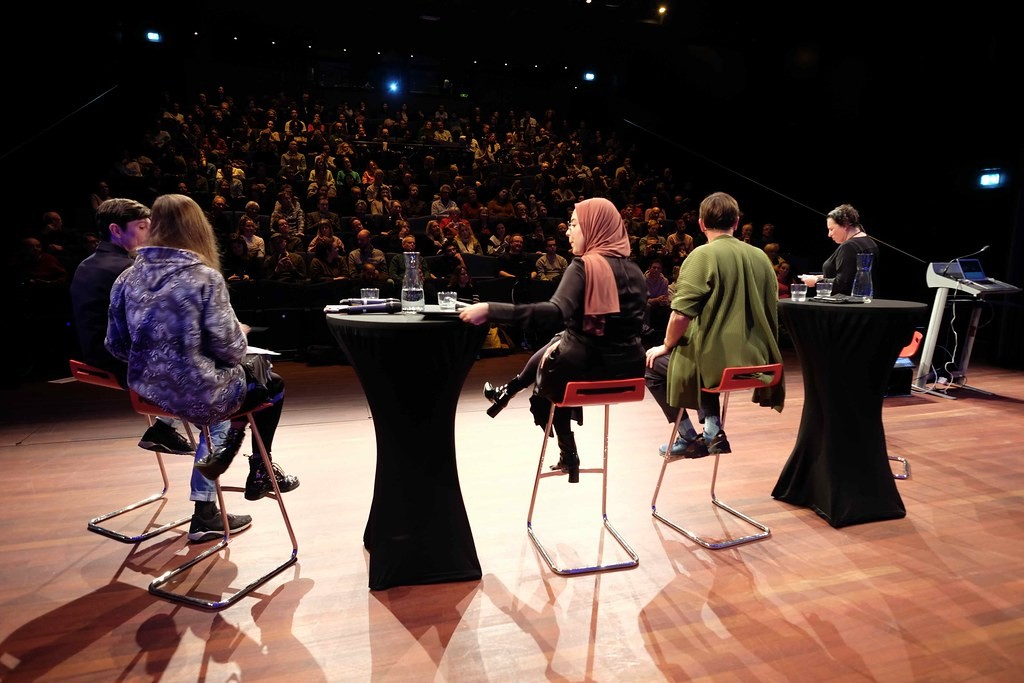
Code of ConductAn open, fair and inclusive space for everyone
This Code of Conduct is inspired by the code of Pakhuis de Zwijger, a partner organisation with which Waag Futurelab frequently collaborates in organising debates and public programmes. This Code of Conduct was last updated on 17 April 2023.
Times are changing, the social debate is rapidly polarising and more and more groups are coming to be diametrically opposed to each other. In all this, language and images are proving to be powerful forms of respective inclusion and exclusion. Waag aims to facilitate a safe place for encounters where everyone feels safe and heard without compromising the open discussion culture.
Waag aims not only to name racism and discrimination, but also to actively fight it. Please also read our anti-racism statement.
With this Code of Conduct, we provide programme makers, moderators, partner organisations and participants with the necessary guidance and tools to navigate through the many fields of social tension. When certain expertise or experience is lacking, this code can provide knowledge and backing. By delineating manners and ways to address, a setting is created where free and open discussion can take place because certain tensions are taken out of the air. Every attendee should experience respect and recognition, mutual understanding should be created and the vocality of disadvantaged people should grow.
With this Code of Conduct, we aim to create a situation where everyone is treated with respect so that Waag is a place for open, honest and safe conversation.
- Everyone will be treated and addressed as an equal and respected person.
- Waag calls its visitors participants. Every attendee is a desired participant in the conversation and a necessary participant in shaping and building a sustainable and inclusive society.
- At Waag, everyone is acknowledged, greeted and addressed. There is no greeting or mention of 'ladies and gentlemen' as this completely excludes the presence of non-binary and/or gender queer individuals. Alternatives: 'Hello dear people', 'Welcome dear people' or: 'Good evening dear participants'.
- Identity is not expertise. Experts and experienced people are two different things. Example: don't turn someone into a professional transgender and a Moroccan Dutchman into a mouthpiece on behalf of the whole community. Provide people with their qualification and profession.
- Freedom of speech is about issues, not individuals, and should never be at the expense of human rights. Ergo: people will not be addressed 'ad hominem' and the existence of certain groups and/or persons is not disputed. In doing so, some sensitivity is desirable. What might be an interesting philosophical issue for one person is a (hard-won) daily reality for another. Example: gender-free toilets are a topic for discussion, the existence of non-binary/trans persons is not.
- At Waag, a person is who they say they are, not what others make of them. No discussion is allowed about self-declared identities such as skin colour, gender, religion, origin, sexual preference or otherwise. Furthermore, one's own identification is not dismissed as an experience, feeling or perception, but as a recognised state of being.
- All participants are consistently called by their first name or surname without regard to gender. No gender splitting, age discrimination or other inequalities will take place.
- The gender of participants is not assumed to be known in advance. In advance, guests will be asked for their preferred personal pronoun and form of address and participants in the audience will be referred to as 'that person' or asked to identify themselves by their name and personal pronoun.
- As with point #6, persons with an illness and/or physical or cognitive challenge indicate themselves how they are referred to. Expressions and words that refer to such challenges, such as 'don't react so spastic', 'I walked like a blind person', 'deaf quail' etc, will be avoided. A person may have an illness and/or physical or cognitive challenge, but will not be referred to in the sense that they 'are' said illness or challenge. In addition, we avoid using words like disabled but speak of visual, physical or other impairment.
- Use of the word 'negro' is out of the question when no interpretation can be given on the origin and evolution of the contested word, in order to provide more context. If necessary and functional, reference to 'the n-word' as such is enough.
- Waag cooperates in decolonising language: 'white' not 'blank'; 'black' not 'dark'; 'double-blood' or 'multi-blood' not 'half-blood'; and 'bicultural' not 'immigrant'. A Dutchman is anyone with Dutch nationality, not anyone with a white skin colour. People with dual nationality are introduced with both nationalities if required (and requested) and population groups are referred to with both nationalities: 'Chinese-Dutchman' and not: 'Chinese' and 'Turkish-Dutchmen' and not: 'Turks'.
- There will be no swearing or cursing towards individuals. This will ensure substantive, safe, polite and respectful conversation for all.
- Do not speak in generalisations or make assumptions for the audience. Examples: 'I am obviously speaking for my own parish here.' 'Of course we all think this here.' 'I don't need to tell you that...' 'Of course we are all...'
- Participants in MBO education are legally called students. We do not speak of 'higher' and 'lower' education, but rather, for example, practically or theoretically educated.
- Waag respects every human being and does not talk about groups of people in terms of natural phenomena. Examples: 'streams of migrants', 'tsunamis of refugees', 'tidal wave of Muslims', etc.
- Population groups are never preceded by a swear word and ethnicity, gender and/or sexual orientation are not adjectives.
- At Waag, we are aware that language is not static and communication is a product of mutual interaction in which we are never done learning. We are open to feedback, correction on possible blind spots and new insights. This document is therefore also subject to change and is regularly reviewed and updated when and where necessary.